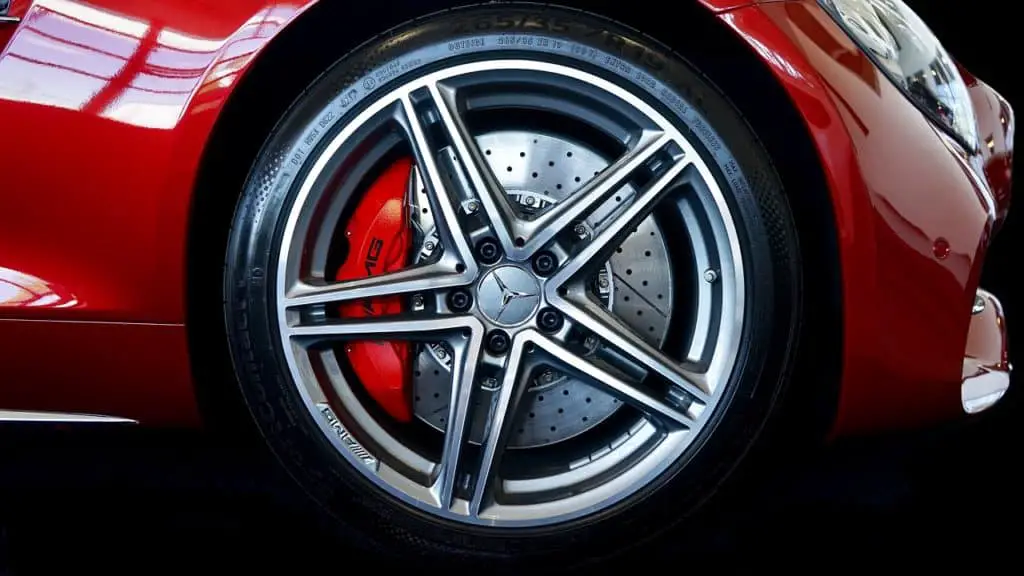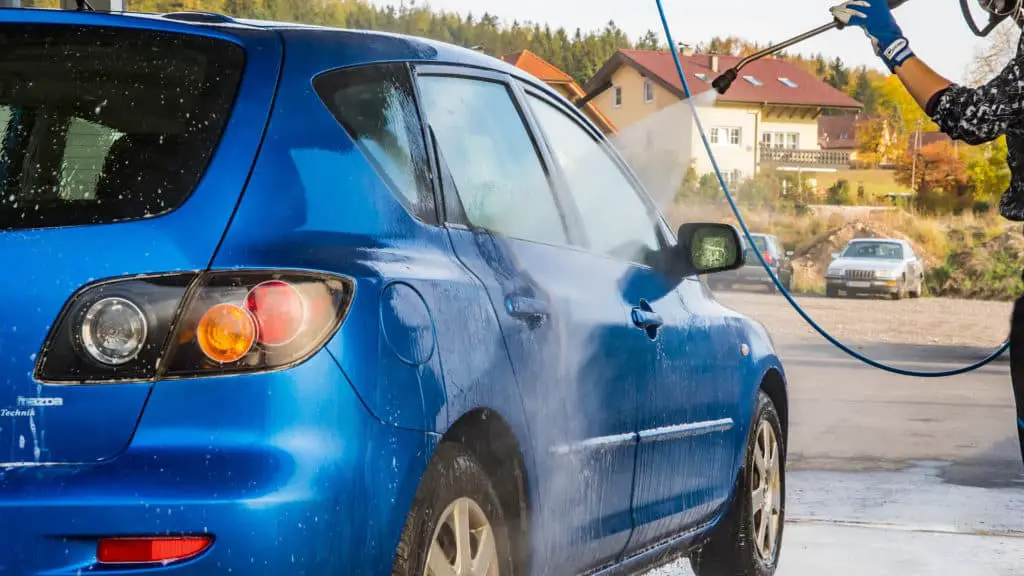- What Is The Two Bucket Car Wash Method (Beginners Guide) - July 2, 2021
- Will Washing Car Remove Wax? What You Need To Know - December 3, 2019
- What Causes Scratches On Car Paint: You Should Know This - April 29, 2019
Last Updated on March 20, 2025 by Nate Schnell
There’s nothing quite as satisfying as seeing your car sparkling clean after a thorough wash. But no matter how glossy your car’s paint looks, dirty wheels can ruin the entire appearance. Cleaning wheels is often overlooked or rushed, leading many to believe a simple rinse is enough. Unfortunately, removing the built-up grime, brake dust, and road debris from wheels requires extra care.
If you’re like most car owners, you might not know exactly what’s causing your wheels to become dirty so quickly. It’s primarily due to brake dust—the fine particles generated when brake pads press against the rotors. This friction produces tiny metal particles that cling to the wheels, making them notoriously difficult to clean thoroughly.
In this comprehensive guide, I’ll walk you through the steps needed to effectively clean alloy and steel wheels. I’ll also cover special care techniques for chrome and black rims, so you can keep your wheels looking showroom-fresh.
Essential Supplies for Cleaning Your Car’s Wheels
Before we get started, you’ll need a few basic cleaning supplies. While you don’t need every item on this list, having the right tools will save you time and effort. I recommend:
- A dedicated wheel cleaner (commercial or homemade)
- A soft-bristle wheel brush or microfiber cleaning mitt
- Two buckets (one for your cleaning solution and one to rinse your brush)
- A garden hose or pressure washer (preferred)
- Microfiber towels
- Tire cleaner and tire shine spray (optional, but highly recommended)
When selecting a wheel cleaner, keep in mind that homemade solutions using distilled vinegar or lemon juice are effective but slightly acidic. Always test these cleaners on a small hidden area of your wheels first to ensure they don’t cause staining or discoloration.
Step-by-Step Guide to Cleaning Alloy Wheels and Rims
Alloy wheels are popular due to their lightweight design and stylish appearance. However, they’re especially prone to accumulating brake dust and road grime. Here’s how you can safely clean them without damaging their finish.
First, thoroughly rinse your wheels with water, preferably using a pressure washer. This helps remove loose dirt and grime and prepares the surface for deep cleaning. If you don’t have a pressure washer, a strong garden hose with a high-pressure attachment will also suffice.
Once the wheels are rinsed, apply your chosen wheel cleaning solution liberally. Allow it to sit on the wheels for two to three minutes, giving the cleaner time to loosen the stubborn dirt and brake dust. Avoid letting the cleaner dry on the wheels, as this could leave marks or residue. It’s best to perform this process out of direct sunlight, in a shaded area.
After the cleaner has settled, scrub the rims gently but firmly with your soft-bristle wheel brush or microfiber mitt. Pay close attention to corners, edges, and between the spokes, where dirt tends to accumulate. Work in a circular pattern, rinsing your brush frequently to avoid spreading dirt around.
Finally, rinse the wheels thoroughly again, making sure you remove all cleaner residue. Use microfiber towels to dry each wheel, preventing water spots and giving your rims a polished look.
For extra shine and long-lasting protection, consider applying a wheel sealant or wax. These products form a protective barrier that reduces future brake dust buildup, making it easier to maintain clean wheels moving forward.
Special Considerations for Steel Wheels and Rims
Steel wheels tend to be more durable and easier to clean than alloy wheels, but they’re also more prone to rust and stubborn grime. The cleaning process remains largely the same, but you may need to put in a bit more elbow grease for tougher dirt or corrosion.
Begin with a thorough rinse, as with alloy wheels. Next, spray your preferred wheel cleaner generously onto the steel rims. If dealing with extremely tough grime, allow the cleaner to sit for three to five minutes, giving it ample time to penetrate and loosen the buildup.
Use a firm brush or an old toothbrush to scrub away rust spots or persistent dirt. Be cautious, though—while steel wheels are sturdier, excessive pressure can still scratch their painted finish. After cleaning, thoroughly rinse away any remaining solution, and dry carefully with microfiber towels.
Applying a protective coating or wax afterward is particularly beneficial for steel wheels. This not only enhances their appearance but significantly reduces future rust formation.
Cleaning Chrome and Black Wheels
Chrome wheels require gentle yet effective care. Avoid harsh abrasives or acidic cleaners like oven cleaners or strong vinegar solutions, as these can dull or damage the chrome finish. Instead, use dedicated chrome wheel cleaners formulated specifically to clean without scratching or harming the reflective surface.
When cleaning black rims, particularly matte-finished ones, avoid glossy or oil-based tire shines, as these can ruin the matte effect. Choose matte-specific wheel cleaning products and microfiber towels to maintain their sleek, low-sheen appearance.
Finishing Touches: Cleaning and Shining Your Tires
Your wheels aren’t fully clean until your tires match their shine. After rinsing and drying your rims, apply a dedicated tire cleaner or a mild detergent solution. Scrub the tires gently with a stiff-bristled brush to remove stubborn dirt and grime.
After rinsing your tires, let them dry fully. Then, apply a tire shine product. Tire shines not only enhance appearance but also provide UV protection, preventing the rubber from fading or cracking over time. For a subtle, elegant shine, use a matte tire dressing instead of a high-gloss product.
Avoiding Common Wheel Cleaning Mistakes
Many car owners make common mistakes when cleaning wheels, such as using overly abrasive brushes, leaving cleaners on too long, or allowing cleaners to dry in direct sunlight. Always ensure your cleaning products are specifically designed for your wheel type and follow the instructions carefully.
Additionally, never clean your wheels last. Cleaning wheels often kicks up dirt and grime onto your car’s paint. Always clean the wheels first, so any splatter onto your paintwork can be easily rinsed away during the car wash.
Final Thoughts
Taking the time to properly clean your wheels doesn’t just improve your vehicle’s appearance—it helps protect your wheels from corrosion, rust, and damage caused by brake dust and road contaminants. With the right cleaning products and techniques, your wheels can look new, complementing your freshly washed car and making your ride stand out.
By following the practical tips shared here, you’ll not only achieve stunning results but also keep your wheels in excellent condition for years to come.



